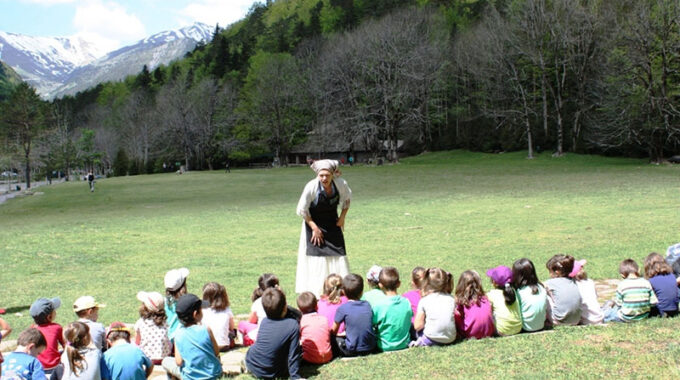The European Geoparks Network (EGN) is seeking to engage a consultant to provide expertise in…

Educational program of the World Sobrarbe-Pirineos Geopark
Boltaña, May 12, 2016. Once again, the World Sobrarbe-Pirineos Geopark has organized a training program for schoolchildren in Sobrarbe aimed at promote awareness of local people about the properties inscribed on the World Heritage List and sites in Geopark, paying particular attention to the role played by the pastoralist culture in the construction of our cultural heritage and archeology as a science that allows us to approach this knowledge.
This action is part of the program “Study and Dissemination of pastoralism in Well Pyrenees Monte Perdido II”, financed 75% by the Ministry of Education, Culture and Sport of the Government of Spain, developed by the Sobrarbe County along 2016, and in one of the acts of the Week of the European Geoparks Network.
This is an action for the dissemination among the local population with which it is intended to reach a very wide range of public, comprising more than 450 schoolchildren from and Primary Education in Sobrarbe, their families and fifty teachers.
Schoolchildren and their teachers will enjoy a day of activities in Pineta, a glacial valley included in the delimitation ofWell Pyrenees Monte Perdido-World Heritage, along with other Spanish sectors (Ordesa, Añisclo, Escuaín) and Frenchsectors (Gavarnie, Estaubé, Troumouse and Barroude).
All this cross border territorys share a common cultural heritage. This is the same cultural area that has developed fromprehistory, based on communities with agro-pastoral way of life.
As in previous years, the agro-pastoral culture will star in the workshops. In previous editions we have worked varioustopics like life forms of prehistoric rock art, treatment of livestock, the life of the shepherd, legends, etc. This year wepay special attention to botany.
In traditional agro-pastoral culture in Sobrarbe, knowledge of food, curative, palliative or toxic qualities of the environmental plants played a central role.
Men and women acquired over the years a deep knowledge about the possible uses of different and varied vegetablespecies that could be found in the territory in which they lived.
This ancient knowledge, which began in prehistoric times, was passed down from generation to generation and is part of the intangible cultural heritage of Well Pyrenees Monte Perdido, linked to their own traditional culture agropastoral.
In short, in 2016 this program is to get students aware of the close relationship that in traditional forms of life existedbetween man and nature in this area, through the example of the use of different vegetables species for human use:from edible plants, used by shepherds as rennet to make cheese, to herbs to cure the sheep from different evils, whichwere used to create remedies, ointments and poultices for humans or those used as an amulet or protective symbol.
Thanks to the invaluable collaboration of teams of teachers, pupils of the school in Paules de Sarsa, who enjoyed thisactivity last week, and the rest of schoolchildren that will do so in the coming days: 16, 17 and 18 May.
Here is a photograph of previous editions of this program, in Tella and Ordesa.



For more information please contact the Heritage Service in the Sobrarbe County, on the phone 974 518 025 or patrimonio@sobrarbe.com



